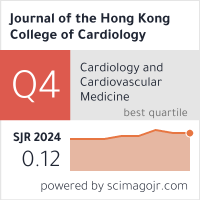Abstract
Adrenomedullin (AM) is a 52 amino acid peptide that was first isolated from human pheochromocytoma. Subsequently, AM and its receptors are found to be distributed widely in the body, including the cardiovascular system. It belongs to a family of peptides that include calcitonin gene-related peptide. In blood vessels, AM causes vasodilation and regulates proliferation. It interacts closely with nitric oxide and has a role in the pathophysiology of hypertension, ischaemic heart disease, cardiac and renal failure. A non-peptide analogue of AM or gene therapy may be of potential therapeutic use. The role of AM in septicaemic shock also merits further investigation.
Recommended Citation
Louisa Yuk-Fung Wong, Bernard Man-Yung Cheung, Carol Yuk-Yin Li, Fai Tang, The Role of Adrenomedullin in the Cardiovascular System Journal of the Hong Kong College of Cardiology 2004;12(3) https://doi.org/10.55503/2790-6744.1111
Creative Commons License

This work is licensed under a Creative Commons Attribution-Noncommercial-No Derivative Works 4.0 License.



